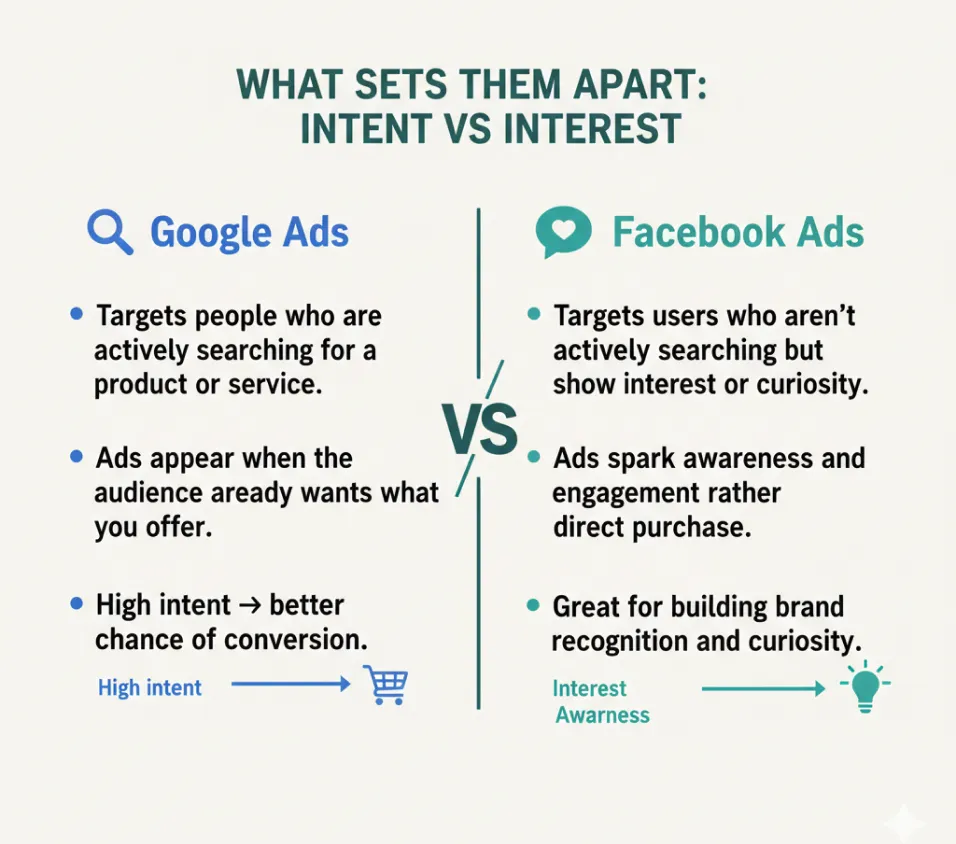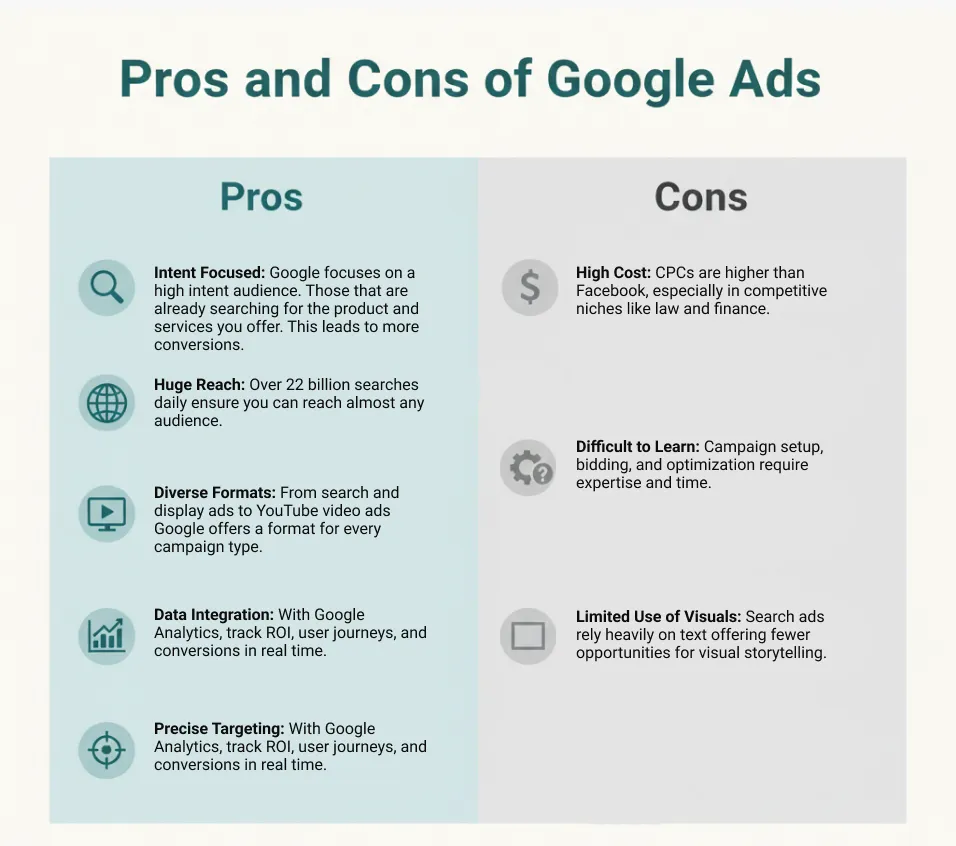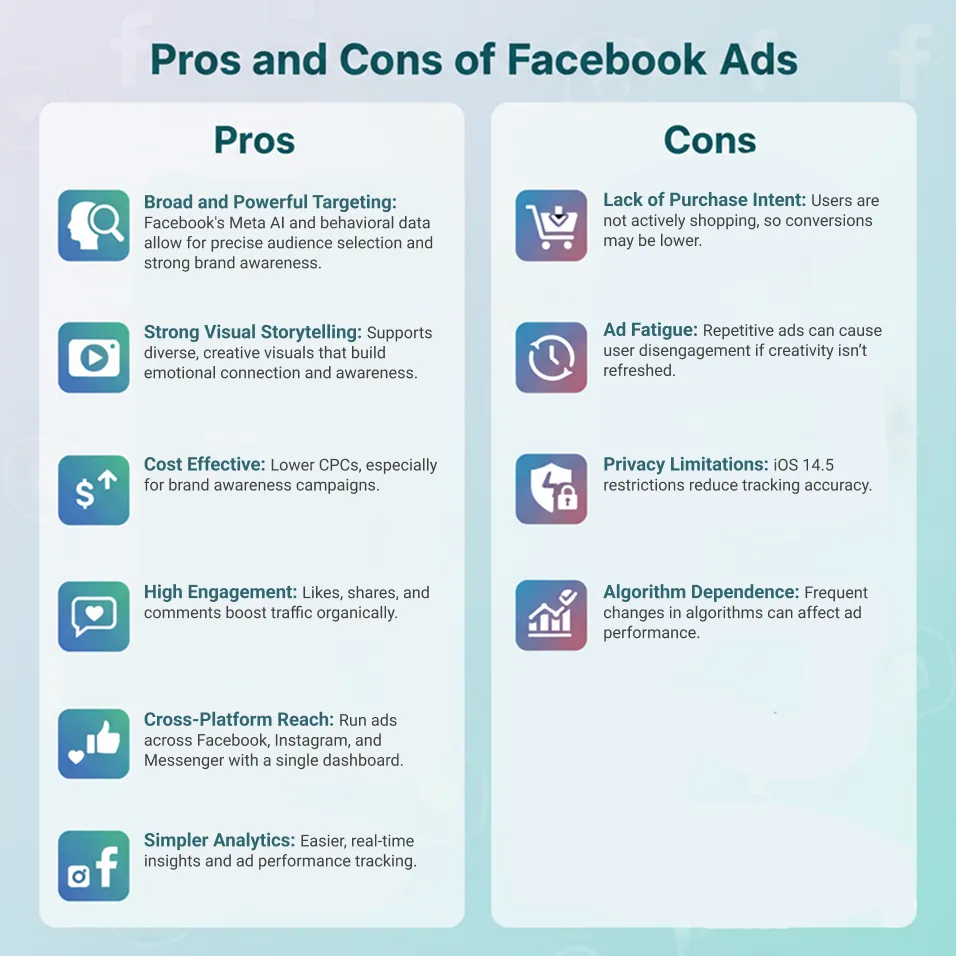- November 11, 2025
- Categories: Digital Marketing
Google Ads vs Facebook Ads: Which Platform Delivers Better Results in 2025
Which is better, facebook or google ads? The big debate around the performance of google ads vs facebook ads is raging hot in 2025. Both promise visibility, clicks and conversions. But which one delivers better results in 2025? In this facebook vs google ads bout, we evaluate both in terms of results, privacy, targeting power, data tracking, costs and ROI. We will go through facts, updates and results. This will present a clear comparison between these two titans of advertisement.
So let’s dive in and see what’s changed, what’s working and which platform delivers better results for you in 2025.
What Sets Them Apart: Intent vs Interest
Before even discussing pros and cons of advertising on google vs facebook and vice versa, we have to first understand how each platform works.Google Ads:
Facebook Ads:
To put it simply.
- Google Ads captures demand.
- Facebook Ads create it.

Targeting: Data Precision vs Behaviour Prediction
AI has changed the game. Data analysis with AI has allowed advertisers to target with unmatched precision. Both Facebook and Google have huge amounts of data. Here is how it impacts their targeting ability.Facebook Ads:
Facebook has gone full psychic in 2025. Thanks to Meta AI systems, it can learn user interests faster than ever. It can target audiences based on age, interests and even predictive intent. It is great for building interest.Google Ads:
Google uses data from Search, Maps, YouTube and Discover. This gives it unmatched precision. For audiences that are ready to buy, Google brings you to them.Verdict
Facebook: Best for discovering audiences with potential buyers.
Google: Best for locating ready to buy audiences.
Costs: Volume vs Value
The costs for both have also changed in 2025. Depending on your business and strategy, you may find one or the other useful.
To learn more about ad costs, check out our blog on PPC costs in 2025.
Facebook Ads:
Facebook Ads are cheaper. It is easier to reach big audiences with them. CPMs are lower. Privacy rules have increased costs a bit but for awareness and reach Facebook Ads remain the cheaper option. Facebook Ads are ideal for brand awareness and visibility.Google Ads:
Google Ads have higher CPCs but their conversion rate justifies it. They are great for quick sales. Ideal for highly competitive markets.Verdict
Advertising on google vs facebook is more costly but has a higher conversion rate.
If you want awareness, Facebook offers better costs.
If you want quick sales, Google is the go to platform in that case.
Creativity: Medium vs Platforms
In terms of creativity facebook vs google ads take a definitive turn.Facebook Ads:
Facebook is a hub of creativity. It’s a platform of narratives. All kinds of media be it videos, carousels and reels are employed by these narratives. Research has shown that high-quality creative increases ROI. High creativity lets you tell your story and create emotional connection with the audience.Google Ads:
Google comes back with Performance Max. Google leverages its platforms and AI to find converting customers across Search, Maps, YouTube, Display, Discover and Gmail. This allows you to reach multiple touchpoints with optimised automation. Google is more conversion focused.Verdict:
Facebook vs google ads have more creative freedom when it comes to choice of media and art direction. Google ads vs facebook ads, do enjoy more cross-platform exposure. This can help with the conversion rate.Tracking: Ease of Use vs Data Driven
Advertising on Google vs Facebook has one clear advantage: tracking. It’s hard to beat Google in tracking. Facebook also has its own tracking system. Here is how they compare.Facebook Ads:
Facebook is more ease focused. It allows dashboard and other tools to make tracking easier. It can give much better real time insights. It’s simple but lacks detail.Google Ads:
Google is king when it comes to data. GA4 gives you insights into performance across multiple channels. It gives full funnel visibility. From first click all the way to conversion. Advertising on Google vs Facebook gives more comprehensive tracking.Verdict:
In terms of data use, Google is unmatched. However Facebook offers ease of use and better insights. The final call really depends on your needs.
If you want ease of use and quick insights then Facebook is the better option.
If you want detail and more data-driven results then go with Google Ads.
Pros and Cons of Google Ads vs Facebook Ads.
Now that we have covered Facebook vs Google Ads in detail. We can summarise their pros and cons as follows.Pros and Cons of Google Ads:
We have analysed google ads vs facebook ads across different metrics. Based on that we define pros and cons of Google Ads.Pros
Here are the pros of Google ads vs Facebook ads.1. Intent Focused:
Google focuses on a high intent audience. Those that are already searching for the product and services you offer. This leads to more conversions.2. Huge Reach:
Google’s has 22 billion searches daily. It can give you access to all kinds of customers. If it’s on Google, it will find its targeted audience.3. Diverse Formats:
Google has multiple platforms. For each type of media you can choose the platform. From text based search ads, to image-rich display to video ads on Youtube. There is a format for every type of ad campaign.4. Data Integration:
If Google has anything, it’s data. Google Analytics give you all the data you need to track ROI and user behaviour with precision. Advertising on Google vs Facebook is more data friendly.5. Precise Targeting:
Google allows you to target based on keywords, demographics, location and any other detail it can get its hands on. Through Google My Business, you are more available and known than ever. To bring you to your customers is easier now than ever for Google.
To learn more about GMB, check out our blog on GMB optimisation.
Cons:
Here are the cons of google ads vs facebook ads.1. High Cost:
Google Ads have higher CPCs. Especially so for highly competitive markets like finance or law.2. Difficult To Learn:
Google Ads may look complex for the beginners. They may find things like keyword bidding, quality scores and campaign setup difficult to master.3. Limited Use of Visuals:
Text based search relies less on visual storytelling. More emphasis is on copy quality. Which is important but lacks the storytelling element of visuals.
Pros and Cons of Facebook Ads
Based on the above discussion we now discuss the pros and cons of Facebook vs Google Ads.Pros
Here are the pros of Facebook vs Google Ads.1. Broad and Powerful Targeting:
Facebook’s use of Meta AI and detailed behavioral data allows for a very broad audience selection. Facebook vs Google Ads create more brand awareness. This audience can act as a pool for potential interested buyers.2. Strong Visual Storytelling:
Facebook vs Google Ads are more visual friendly and creative. Facebook’s diverse use of visuals can help with visual storytelling. This builds emotional connection and awareness.
To learn more about visual hooks, check out our guide on graphic design trends in 2025.
3. Cost Effective:
Facebook vs Google Ads, have low CPCs. This is especially so for brand awareness campaigns. To create awareness, facebook ads are the cost effective option.4. High Engagement:
Ads have flow on effect on comments, shares and likes which helps boost your traffic.5. Cross-Platform Reach:
You use a single dashboard to run campaign across Facebook, Instagram and Messenger.6. Simpler Analytics:
The use of data analytics is simpler for Facebook vs Google ads. This ease of use helps with real time tracking.Cons:
Here are the cons of Facebook vs Google ads.1. Lack of Purchase Intent:
Usually Facebook users are not active buyers. They are not actively looking for a product or service to buy. Therefore conversion rates may be low.2. Ad Fatigue:
Repeated use of an Ad can create Ad fatigue. This can happen if your creativity doesn’t refresh often.3. Privacy Limitations:
Post iOS 14.5, data tracking restrictions have reduced ad accuracy.4. Algorithm Dependance:
Due to changes in algorithms, efficacy of an ad campaign may be affected.
Facebook Vs Google Ads: A False Comparison?
After all we have discussed, here is the clear truth:- The winning brands in 2025 aren’t choosing between Google ads vs Facebook ads. They are synchronising them.
- Facebook Ads to incite curiosity and brand awareness.
- Google Ads to capture high intent users and close sales.
Facebook Ads gets you to your audience.
Google Ads helps you seal the deal.
You can use this system to well and truly optimise your ad strategy.
Final Verdict, Going Beyond Platforms With XoomPlus
When it comes to advertising on Google vs Facebook there is no fixed winner. Each platform has their own pros and cons. Facebook vs Google ads is not about choosing sides. It’s about synergy. Each is suited for a different stage of a buyer’s journey.
The right way is to use them both in a coherent ad strategy. We at XoomPlus understand this. At XoomPlus we craft integrated ad strategies that merge the reach of Facebook ads with the reach of Google Ads. Check out our PPC ad services to turn your clicks into clients.
Your Ad budget deserves better than a coin toss.
Contact us and book your free ad audit today. Engineer your next ad breakthrough with us.
Faqs
It depends on your goal. If you want direct conversions and high-intent leads, Google Ads generally performs better because users are actively searching. But if you aim for brand awareness and audience engagement, Facebook Ads offers stronger targeting and visual storytelling.
Typically, yes — Google Ads can be more expensive due to keyword bidding competition. However, the return on investment (ROI) can also be higher if your ads target the right search intent. Facebook Ads are often cheaper per click but may convert at lower rates depending on your niche.
Absolutely. Many marketers combine both. You can use Facebook Ads for awareness and retargeting, while Google Ads captures people when they’re ready to buy. This strategy blends the best of advertising on Google vs Facebook for full-funnel marketing.
Google Ads can drive quicker results because your ads show immediately for active search queries. Facebook Ads usually take time to optimize, build audience data, and generate engagement before delivering consistent conversions.
Facebook Ads is generally easier for beginners due to its visual interface and guided campaign setup. Google Ads has a steeper learning curve but offers more control and scalability once mastered.
Businesses that rely on visuals or impulse-driven purchases — such as fashion, fitness, real estate, or lifestyle brands — tend to perform well on Facebook and Instagram. Storytelling through images or video is key.
Service-based or solution-oriented businesses — like law firms, clinics, or software companies — perform best on Google because users are already searching for answers or products.
Start by allocating 60% to your high-intent platform (usually Google) and 40% to awareness and remarketing (usually Facebook). Track conversions and adjust monthly based on performance data.
Facebook Ads offers deeper demographic, behavioral, and interest-based targeting. Google Ads excels in intent-based targeting using keywords and search behavior. Both are powerful — just in different ways.
After iOS 14.5, Facebook’s tracking capabilities became limited, reducing ad precision. Using server-side tracking and Meta’s Conversion API helps regain some accuracy in measuring ad results.

